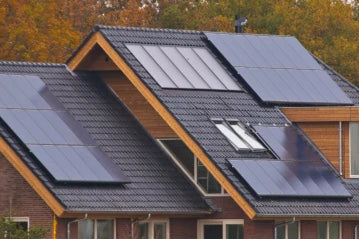
Can I Use a Charge Controller with a Hybrid Inverter?
If you are planning to install a solar energy system in your home or business, you might be wondering if you need a charge controller with a hybrid inverter. A charge controller is a device that regulates the voltage and current from the solar panels to the battery bank, while a hybrid inverter is a device that converts the direct current (DC) from the battery bank to alternating current (AC) for your appliances and grid connection. In this blog post, we will explain the benefits and drawbacks of using a charge controller with a hybrid inverter, and how to choose the best option for your needs.
What is a Charge Controller?
A charge controller is an essential component of any off-grid or grid-tie solar energy system that uses batteries. It protects the batteries from overcharging and over-discharging, which can damage their lifespan and performance. A charge controller also optimizes the charging process by adjusting the voltage and current according to the battery's state of charge and temperature.
There are two main types of charge controllers: PWM (pulse width modulation) and MPPT (maximum power point tracking). PWM charge controllers are cheaper and simpler, but they are less efficient and compatible with modern solar panels. MPPT charge controllers are more expensive and complex, but they can extract up to 30% more power from the solar panels and adapt to different voltages and weather conditions.
What is a Hybrid Inverter?
A hybrid inverter is a device that combines the functions of a grid-tie inverter and an off-grid inverter. A grid-tie inverter converts the DC power from the solar panels to AC power for your appliances and feeds the excess power to the grid, while an off-grid inverter converts the DC power from the battery bank to AC power for your appliances and isolates your system from the grid in case of a blackout. A hybrid inverter can do both, depending on your preference and situation.
A hybrid inverter can also integrate with a smart meter and a cloud platform, which allows you to monitor and control your solar energy system remotely. You can also set up different modes of operation, such as self-consumption, peak shaving, time-of-use, or backup power.
Benefits of Using a Charge Controller with a Hybrid Inverter
Using a charge controller with a hybrid inverter can offer several advantages for your solar energy system, such as:
- More flexibility: You can choose whether to store or sell your excess solar power, depending on your electricity tariff and demand. You can also switch between grid-tie and off-grid modes as needed.
- More reliability: You can have backup power in case of a grid outage or emergency. You can also protect your batteries from overcharging and over-discharging, which can extend their lifespan and performance.
- More efficiency: You can maximize the power output from your solar panels by using an MPPT charge controller, which can adapt to different voltages and weather conditions. You can also reduce the conversion losses by using a single device instead of two separate inverters.
Drawbacks of Using a Charge Controller with a Hybrid Inverter
Using a charge controller with a hybrid inverter can also have some disadvantages for your solar energy system, such as:
- Higher cost: You will need to invest more upfront for buying a charge controller and a hybrid inverter, as well as additional wiring and installation costs. You will also need to maintain and replace them more frequently than a single inverter.
- Higher complexity: You will need to configure and synchronize your charge controller and hybrid inverter properly, which can be challenging and time-consuming. You will also need to deal with more components and connections, which can increase the risk of errors and failures.
- Lower compatibility: You will need to make sure that your charge controller and hybrid inverter are compatible with each other, as well as with your solar panels, batteries, appliances, and grid standards. You might face some issues with communication protocols, firmware updates, or warranty claims.
How to Choose the Best Option for Your Needs
Whether you need a charge controller with a hybrid inverter or not depends on several factors, such as:
1. Your budget: If you have a limited budget, you might want to opt for a single inverter that can handle both grid-tie and off-grid functions. However, if you have more funds available, you might want to invest in a charge controller and a hybrid inverter that can offer more flexibility and reliability.
2. Your goals: If you want to maximize your self-consumption and backup power, you might want to use a charge controller with a hybrid inverter that can store or sell your excess solar power according to your preference. However, if you want to simplify your system and reduce your maintenance costs, you might want only a hybrid inverter.
3. Your location: If you live in an area with frequent power outages or unreliable grid service, you might want to use a charge controller with a hybrid inverter that can switch seamlessly between grid and battery modes. However, if you live in an area with stable grid service and low electricity prices, you might want to use a single inverter that can reduce your system complexity and installation costs.
4. Your regulations: If you live in a region with favorable net metering policies or feed-in tariffs, you might want to use a charge controller with a hybrid inverter that can sell your excess solar power to the grid and earn you money. However, if you live in a region with restrictive net metering policies or high grid fees, you might want to use a single inverter that can avoid unnecessary grid interactions and save you money.


0 Kommentare